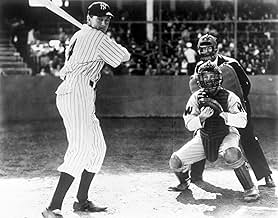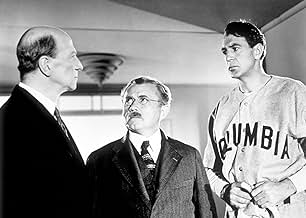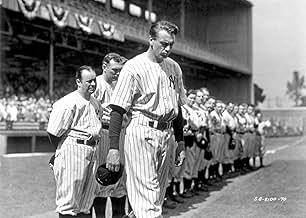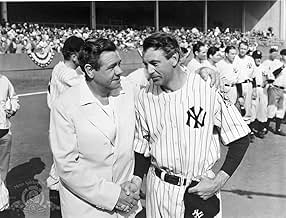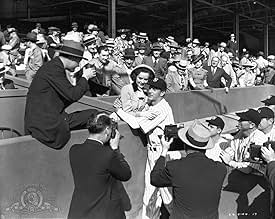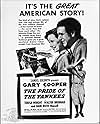NOTE IMDb
7,6/10
13 k
MA NOTE
Ajouter une intrigue dans votre langueThe story of the life and career of famed baseball player Lou Gehrig.The story of the life and career of famed baseball player Lou Gehrig.The story of the life and career of famed baseball player Lou Gehrig.
- Réalisation
- Scénario
- Casting principal
- Récompensé par 1 Oscar
- 5 victoires et 10 nominations au total
Ludwig Stössel
- Pop Gehrig
- (as Ludwig Stossel)
Bob Meusel
- Robert W. Meusel
- (as Robert W. Meusel)
Avis à la une
The only reason I don't give this film a perfect 10 is that I think Gary Cooper was a bit too old to be playing Lou Gehrig as a youth. Cooper was 41 when Pride of the Yankees was made. He was two years older than Lou Gehrig actually was.
While not terribly convincing as a college age Gehrig at Columbia University, the part of Gehrig grew into Cooper as Gehrig aged cinematically. And of course his recreation of Lou Gehrig's farewell to baseball got him an Oscar nomination.
Henry Louis Gehrig, child of German immigrants who grew up in the Yorkville section of Manhattan, was arguably the greatest first baseman baseball has ever known. He certainly has very few competitors for the honor. His famous record of 2130 consecutive games was bettered about a decade ago by Cal Ripken, but he still holds the major league record for lifetime grand-slam home runs, 23 and the American League RBI record for a single season, 184. He is one of a select group of ballplayers to have won the Triple Crown, he did that in 1934. His lifetime batting average of .340 is only topped by a handful.
He was as writer Frank Graham put it, baseball's "quiet hero." Until he was forced from baseball by the disease he gave his name to Gehrig played second fiddle to the flamboyant Babe Ruth and then to a graceful rookie named Joe DiMaggio.
The facts of Gehrig's life are somewhat jumbled in this film for dramatic coherency, but the essence of his character is brought out in the script by Paul Gallico. In fact Gallico wrote himself into the film as sportswriter Sam Blake as played by Walter Brennan.
Gary Cooper and Lou Gehrig and Teresa Wright as Eleanor Twitchell Gehrig both received Oscar nominations for their portrayals.
It should also not be forgotten that Lou Gehrig was a German American and I believe one of the reasons the film was made was that at that time we were fighting Germany. The German American Bund had its following and very much so in Lou Gehrig's Yorkville neighborhood. German Americans certainly had other and better role models than the Bund.
I remember as a lad going to Yankee old-timers games and there was always a moment of reverential silence when the Yankee widows, Claire Hodgson Ruth and Eleanor Twitchell Gehrig were always introduced. Both survived their husbands by many years.
In fact when Teresa Wright died this past year when the roll call of former Yankees who had passed on her name was read out among all the ballplayers. It was a fitting tribute to a great actress and a woman who didn't know a thing about baseball before she did this film, but became a devoted fan afterward. I guess that was her private tribute to Lou Gehrig.
There is still no cure for amytrophic lateral sclerosis or now known as Lou Gehrig's Disease. A lot of other noted persons have passed on from it, Jacob Javits, David Niven, Ezzard Charles, Dennis Day and former Vice President Henry A. Wallace. Still we can hope for a dedicated and inspired scientist to find a cure.
Until then we have this inspirational movie and Lou Gehrig's inspired and remembered life.
While not terribly convincing as a college age Gehrig at Columbia University, the part of Gehrig grew into Cooper as Gehrig aged cinematically. And of course his recreation of Lou Gehrig's farewell to baseball got him an Oscar nomination.
Henry Louis Gehrig, child of German immigrants who grew up in the Yorkville section of Manhattan, was arguably the greatest first baseman baseball has ever known. He certainly has very few competitors for the honor. His famous record of 2130 consecutive games was bettered about a decade ago by Cal Ripken, but he still holds the major league record for lifetime grand-slam home runs, 23 and the American League RBI record for a single season, 184. He is one of a select group of ballplayers to have won the Triple Crown, he did that in 1934. His lifetime batting average of .340 is only topped by a handful.
He was as writer Frank Graham put it, baseball's "quiet hero." Until he was forced from baseball by the disease he gave his name to Gehrig played second fiddle to the flamboyant Babe Ruth and then to a graceful rookie named Joe DiMaggio.
The facts of Gehrig's life are somewhat jumbled in this film for dramatic coherency, but the essence of his character is brought out in the script by Paul Gallico. In fact Gallico wrote himself into the film as sportswriter Sam Blake as played by Walter Brennan.
Gary Cooper and Lou Gehrig and Teresa Wright as Eleanor Twitchell Gehrig both received Oscar nominations for their portrayals.
It should also not be forgotten that Lou Gehrig was a German American and I believe one of the reasons the film was made was that at that time we were fighting Germany. The German American Bund had its following and very much so in Lou Gehrig's Yorkville neighborhood. German Americans certainly had other and better role models than the Bund.
I remember as a lad going to Yankee old-timers games and there was always a moment of reverential silence when the Yankee widows, Claire Hodgson Ruth and Eleanor Twitchell Gehrig were always introduced. Both survived their husbands by many years.
In fact when Teresa Wright died this past year when the roll call of former Yankees who had passed on her name was read out among all the ballplayers. It was a fitting tribute to a great actress and a woman who didn't know a thing about baseball before she did this film, but became a devoted fan afterward. I guess that was her private tribute to Lou Gehrig.
There is still no cure for amytrophic lateral sclerosis or now known as Lou Gehrig's Disease. A lot of other noted persons have passed on from it, Jacob Javits, David Niven, Ezzard Charles, Dennis Day and former Vice President Henry A. Wallace. Still we can hope for a dedicated and inspired scientist to find a cure.
Until then we have this inspirational movie and Lou Gehrig's inspired and remembered life.
After seeing this movie, I went out and bought the Ken Burns documentary on Baseball. It's amazing how nice of a guy Lou Gherig was! He was a true gentleman. He brought his Mom to ALL THE GAMES. He was a true hero as well. I liked this movie and it was very sad to see Lou get stiff toward the end of the movie. Babe Ruth played himself and that was no hard task for him. I bought this movie it was so darn good.
Gary Cooper may have won his Oscar for SERGEANT YORK--but I think he deserved it even more for PRIDE OF THE YANKEES. I've never seen him give a more heartfelt, natural and completely likeable performance than I have here. And Teresa Wright is glowing as his sweetheart.
It tells Lou Gehrig's story in a simple, straightforward manner with only an occasional bit of Hollywood corn, the kind so typical of the 1940s. But the main storyline is carried by Cooper and Wright with some great assist from Walter Brennan. Brennan drops a lot of his cornball mannerisms (the kind he uses he in all his Western roles) and plays it straight here--with excellent results.
But it's Cooper's achievement--no doubt about that. If the last twenty minutes of the film don't move you to tears, you're made of stone. Cooper gets across the panic and fear that hits him with the first signs of his illness--with a subtle show of facial expressions. He's really into his character here and gives one of the best performances of his career.
Knowing someone who died from this disease, I was especially moved at how the first signs of illness were shown here.
Douglas Croft does a fine job as the young Lou--and by the way, whatever happened to him? He played Ronald Reagan as a boy in KINGS ROW and did several other films in the '40s. And how come Dane Clark received no billing in the credits? He was only seen early on in the film but he had a line of dialogue as one of Lou's fraternity pals. He had no credit in Alan Ladd's THE GLASS KEY too--he's the man Brian Donlevy shoves through a plate glass window. A year later he was being given the star buildup at Warner Bros.
A great film and a wonderful tribute to Lou Gehrig.
It tells Lou Gehrig's story in a simple, straightforward manner with only an occasional bit of Hollywood corn, the kind so typical of the 1940s. But the main storyline is carried by Cooper and Wright with some great assist from Walter Brennan. Brennan drops a lot of his cornball mannerisms (the kind he uses he in all his Western roles) and plays it straight here--with excellent results.
But it's Cooper's achievement--no doubt about that. If the last twenty minutes of the film don't move you to tears, you're made of stone. Cooper gets across the panic and fear that hits him with the first signs of his illness--with a subtle show of facial expressions. He's really into his character here and gives one of the best performances of his career.
Knowing someone who died from this disease, I was especially moved at how the first signs of illness were shown here.
Douglas Croft does a fine job as the young Lou--and by the way, whatever happened to him? He played Ronald Reagan as a boy in KINGS ROW and did several other films in the '40s. And how come Dane Clark received no billing in the credits? He was only seen early on in the film but he had a line of dialogue as one of Lou's fraternity pals. He had no credit in Alan Ladd's THE GLASS KEY too--he's the man Brian Donlevy shoves through a plate glass window. A year later he was being given the star buildup at Warner Bros.
A great film and a wonderful tribute to Lou Gehrig.
Superior biography of Lou Gehrig who had everything before ALS paid him a visit.
Gary Cooper is terrific as Gehrig. He was the embodiment of a plain, aw shucks guy who made it big in baseball. Teresa Wright had the right flavor as Eleanor, his loving wife.
There are fine supporting performances by Elsa Janssen and Ludwig Stossel as his parents.
The film is great because it shows a warm, loving family, poor financially but rich in spirit.
Rather than concentrate on all his baseball achievements, the film deals with Gehrig, the man and what a great, kindly gentleman that he was.
Walter Brennan, who made so many films with Cooper, appears again this time as a sports writer. He befriends him and becomes a close family friend. Dan Duryea, as a cynical reporter, is quite effective in a small role. He seems to have it in for Lou but succumbs like everyone else during that famous farewell speech.
What also made this film a classic was the use of Babe Ruth and other Yankees play themselves. Had the Babe lived, he could have been in films.
A definite film detailing the human spirit. When Gehrig meets the boy that he had "hit 2 home runs" for years later, your heart will go out. That scene, along with the farewell speech, was poignant.
Gary Cooper is terrific as Gehrig. He was the embodiment of a plain, aw shucks guy who made it big in baseball. Teresa Wright had the right flavor as Eleanor, his loving wife.
There are fine supporting performances by Elsa Janssen and Ludwig Stossel as his parents.
The film is great because it shows a warm, loving family, poor financially but rich in spirit.
Rather than concentrate on all his baseball achievements, the film deals with Gehrig, the man and what a great, kindly gentleman that he was.
Walter Brennan, who made so many films with Cooper, appears again this time as a sports writer. He befriends him and becomes a close family friend. Dan Duryea, as a cynical reporter, is quite effective in a small role. He seems to have it in for Lou but succumbs like everyone else during that famous farewell speech.
What also made this film a classic was the use of Babe Ruth and other Yankees play themselves. Had the Babe lived, he could have been in films.
A definite film detailing the human spirit. When Gehrig meets the boy that he had "hit 2 home runs" for years later, your heart will go out. That scene, along with the farewell speech, was poignant.
First off, my favorite actor of all time is Gary Cooper. I love his acting style, the gawkiness he often used in his screen roles, in addition of course to the fact that I thought he was absolutely gorgeous, in his prime (when he was in his 30's and 40's). Cooper's appeal is only enhanced, for me, by the distance of his on screen persona from his real-life one...he was quite the ladies' man in real life, not awkward with women as the characters he often portrayed on screen, and his smoldering sexuality shows from his piercing blue eyes. His lively offscreen affairs with stars such as Clara Bow (who famously declared "He's hung like a horse and he can go all night!"), Lupe Velez aka "The Mexican Spitfire", and of course Patricia Neal, are the stuff of old Hollywood legend.
Kevin Costner and Ralph Fiennes in their primes had nothing' on Coop. He was the man. Cooper, who started off wanting to be an artist, fell into acting instead, first as a stunt man in westerns, but quickly getting leading roles. He continued to do most of his own riding and stunts even into his later years, carving himself quite a name as a star of westerns, including the western classic "High Noon" (1952), but my favorite films of his were films such as "Mr. Deeds Goes To Town" (1936), "Meet John Doe" (1941), "Ball Of Fire" (1941), "Sargeant York" (1941), and of course "The Pride Of The Yankees". My husband understands my adoration of Gary Cooper; and/but we had this brief discussion before we watched my recently purchased DVD of the film (I'd seen it before, but didn't own a copy of it):
Husband: "I don't mind watching it with you as long as you don't make those noises you always make when you watch a Gary Cooper movie."
Me: "What noises?"
Husband: "Those noises like the ones Homer Simpson makes when he looks at a stick of butter...'Mmmmmmmm'...."
Me: "What? I didn't know I did that. Okay, I won't make any weird noises while we watch it."
So I was quiet (except for of course choking up in tears when Cooper delivers Gehrig's legendary "Today, I consider myself to be the luckiest man on the face of the earth" farewell speech). Gehrig's retirement speech helped immortalize him as a hero and an all-American role model.
"The Pride of the Yankees" is the blueprint for the sports biopic, and is generally considered to be the best movie about baseball ever made. Teresa Wright stars as his wife Eleanor. Wright, who just passed away this March, was an excellent actress, and a beautiful woman. The last film I saw her in was in a small part in "Somewhere In Time", and she had aged wonderfully. She and Cooper had great chemistry on screen, holding her own ground as he towered over her petite 5'3" frame.
Walter Brennan, a frequent Cooper co-star and real-life friend, and Babe Ruth as himself are two other co-stars who contribute much to the film.
The film traces the rags-to-riches story of Gehrig, as his childhood dream comes true when he's signed to the New York Yankees, and his untimely retirement when he is stricken with the fatal, neurological disease ALS (amyotrophic lateral sclerosis) which was afterwards simply called "Lou Gehrig's Disease". Cooper, although a bit of an odd choice for the part (one reason being his height, he was about 6'4"), gives an endearing, heartfelt, dignified performance, for which he was nominated for an Academy Award. Gehrig was left-handed, Cooper right-handed, which was further complicated by the fact that Cooper himself wasn't a capable baseball player. For the filming, his uniform had "New York" printed backwards on it, he ran to third base when he hit a ball, and then the print was reversed.
Nominated for 11 Academy Awards in all, and receiving 1 (for Film Editing), "The Pride Of The Yankees" still stands as a must-see film for baseball fans and fans of classic cinema alike.
Kevin Costner and Ralph Fiennes in their primes had nothing' on Coop. He was the man. Cooper, who started off wanting to be an artist, fell into acting instead, first as a stunt man in westerns, but quickly getting leading roles. He continued to do most of his own riding and stunts even into his later years, carving himself quite a name as a star of westerns, including the western classic "High Noon" (1952), but my favorite films of his were films such as "Mr. Deeds Goes To Town" (1936), "Meet John Doe" (1941), "Ball Of Fire" (1941), "Sargeant York" (1941), and of course "The Pride Of The Yankees". My husband understands my adoration of Gary Cooper; and/but we had this brief discussion before we watched my recently purchased DVD of the film (I'd seen it before, but didn't own a copy of it):
Husband: "I don't mind watching it with you as long as you don't make those noises you always make when you watch a Gary Cooper movie."
Me: "What noises?"
Husband: "Those noises like the ones Homer Simpson makes when he looks at a stick of butter...'Mmmmmmmm'...."
Me: "What? I didn't know I did that. Okay, I won't make any weird noises while we watch it."
So I was quiet (except for of course choking up in tears when Cooper delivers Gehrig's legendary "Today, I consider myself to be the luckiest man on the face of the earth" farewell speech). Gehrig's retirement speech helped immortalize him as a hero and an all-American role model.
"The Pride of the Yankees" is the blueprint for the sports biopic, and is generally considered to be the best movie about baseball ever made. Teresa Wright stars as his wife Eleanor. Wright, who just passed away this March, was an excellent actress, and a beautiful woman. The last film I saw her in was in a small part in "Somewhere In Time", and she had aged wonderfully. She and Cooper had great chemistry on screen, holding her own ground as he towered over her petite 5'3" frame.
Walter Brennan, a frequent Cooper co-star and real-life friend, and Babe Ruth as himself are two other co-stars who contribute much to the film.
The film traces the rags-to-riches story of Gehrig, as his childhood dream comes true when he's signed to the New York Yankees, and his untimely retirement when he is stricken with the fatal, neurological disease ALS (amyotrophic lateral sclerosis) which was afterwards simply called "Lou Gehrig's Disease". Cooper, although a bit of an odd choice for the part (one reason being his height, he was about 6'4"), gives an endearing, heartfelt, dignified performance, for which he was nominated for an Academy Award. Gehrig was left-handed, Cooper right-handed, which was further complicated by the fact that Cooper himself wasn't a capable baseball player. For the filming, his uniform had "New York" printed backwards on it, he ran to third base when he hit a ball, and then the print was reversed.
Nominated for 11 Academy Awards in all, and receiving 1 (for Film Editing), "The Pride Of The Yankees" still stands as a must-see film for baseball fans and fans of classic cinema alike.
Le saviez-vous
- AnecdotesReleased just 17 months after Lou Gehrig's death.
- GaffesAs Gehrig (Cooper) is doing his homework at Columbia, he writes with his right hand. Whilst Gehrig batted and threw left-handed, like many lefties of the era (perhaps because of "correction" in school), he wrote with his right hand.
- Citations
[last lines]
Lou Gehrig: [his farewell speech]
Lou Gehrig: Today, I consider myself the luckiest man on the face of the earth... play ball!
- Crédits fousOpening credits acknowledgment: Appreciation is expressed for the gracious assistance of Eleanor Gehrig (as Mrs. Lou Gehrig) and for the cooperation of Ed Barrow (as Mr. Ed Barrow) and the New York Yankees arranged by Christy Walsh.
- Versions alternativesA colorized version is available.
- ConnexionsFeatured in Diamonds on the Silver Screen (1992)
- Bandes originalesTake Me Out to the Ball Game
(1908) (uncredited)
Music by Albert von Tilzer
Played during the opening credits and often in the score
Meilleurs choix
Connectez-vous pour évaluer et suivre la liste de favoris afin de recevoir des recommandations personnalisées
Détails
- Date de sortie
- Pays d’origine
- Langue
- Aussi connu sous le nom de
- La fierté des Yankees
- Lieux de tournage
- Société de production
- Voir plus de crédits d'entreprise sur IMDbPro
- Durée2 heures 8 minutes
- Couleur
- Rapport de forme
- 1.37 : 1
Contribuer à cette page
Suggérer une modification ou ajouter du contenu manquant


